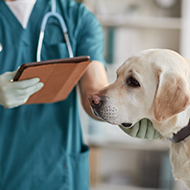RCVS announces changes to Practice Standards Scheme

The PSS quality assurance scheme undergoes a review every five years.
The RCVS has announced a series of changes to its Practice Standards Scheme (PSS) following a comprehensive review by the Practice Standards Group (PSG).
Under the changes, participating practices will be required to have clear mental health and wellbeing policies, support mechanisms for staff that need help, and must ensure that members of staff take sufficient breaks and annual leave.
President Mandisa Greene, who also chairs the PSG, said the move "reflects the increasing focus there has been on mental health and wellbeing" in recent years and the recognition "that a healthy workforce provides a better service to its patients and clients.”
“Likewise, the enhanced status and role of veterinary nursing is recognised in the update with expectations that practices should have sufficient levels of nursing staff and that, at Veterinary Hospital accreditation level, all patients should have a nursing plan," she said.
The PSS quality assurance scheme undergoes a review every five years to ensure that the standards it is asking its practices to meet reflect the latest in best practice.
Postponed 12 months owing to the coronavirus pandemic, the review is conducted by the PSG, which consists of the BVA, BVNA, BSAVA, BEVA, VMG, SPVS. the British Association of Emergency & Critical Care, the BCVA and the British Veterinary Hospital Association (BVHA).
Some of the other major changes to the PSS requirements include:
- clinical governance: PSS practices accredited as General Practice level will need to demonstrate the use of clinical audit, significant event audits and the development of guidelines and protocols around clinical governance.
- infection control: at all accreditation levels there are new requirements on the provision of infection control, including risk-based deep cleaning and the minimisation of cross-infection.
- in-patients: animal owners will have to provide signed consent to demonstrate they understand the level of overnight care that will be provided for their animals as in-patients.
Practices at Core Standards accreditation level will need to have provisions to ensure the welfare of patients if left unattended overnight while practices accredited as Veterinary Hospital level will need to have sufficient team members, including an RVN during all normal opening hours, on-site at all times and provide protocols and checklists for handovers between day and night teams.
- medical records: General Practice accredited practices will need to have a computerised Practice Management System, with records being accessible from and transferable between all branches. They will need to provide written discharge instructions and show regular recording of bodyweight and Body Condition Score.
- nursing: At least one RVN will need to be employed at General Practice level.
- surgery: there are several enhancements to surgical facilities and protocols in the update, including the need to avoid any outdoor clothing or footwear in the operating theatre for practices accredited at General Practice level.
There are further requirements for the investigation of surgical site infections, including the use of bacteriology for General Practice and Veterinary Hospital accredited practices. Surgical lighting is required for Core Standards practices and must be directable for General Practice level.
There are also several changes to the requirements for PSS Awards, including a condition under the Nursing Award to have a 1:1 ratio of veterinary nurses to veterinary surgeons.
David Ashcroft, who leads the team of PSS Assessors, said: “The changes will come into force later in the year, at the same time as we are planning to return to in-person assessments, and so timings will be subject to government guidance on coronavirus and the easing of lockdown restrictions.
“As the PSS returns to in-person assessments, practices will have the usual three-month period between booking the assessment and the assessment taking place with which to familiarise themselves with the changes and the modules documents relevant to their accreditation."
He added: “If anyone has any questions about the changes then please make sure to contact the Practice Standards Team on pss@rcvs.org.uk and we will be happy to help in any way we can.”
The full list of changes to the Practice Standards Scheme, together with the new module and award documents, can be found at rcvs.org.uk/PSSreview



 FIVP has shared a survey, inviting those working in independent practice to share their views on the CMA's proposed remedies.
FIVP has shared a survey, inviting those working in independent practice to share their views on the CMA's proposed remedies.